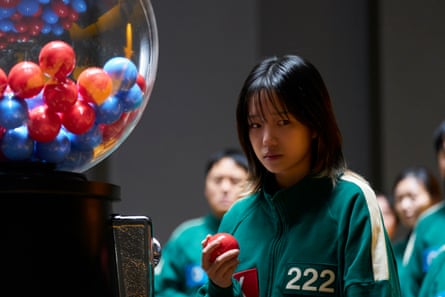The two main talking points of the third and final season of Squid Game are both massive spoilers. This means that I won’t be able to mention the final minute of the whole thing, which contains a moment so WTF and genuinely surprising that I bet my editor a serious amount of money she wouldn’t be able to guess what happens. She couldn’t, thankfully, but such reckless gambling is the sort of behaviour that would land me in Squid Game in the first place, so it just shows that nobody here has learned any lessons from it whatsoever.
Nor should I talk about another key development, though in this case, it becomes so central that it needs to be mentioned somehow. So, vaguely speaking, a new player is forced to enter the games, without being capable of giving their consent, and becomes the focus of later episodes. It is odd to criticise Squid Game for not being credible, given that it is a hit show about an underground tournament in which children’s games are played until many or most of the participants die, but introducing this new player is completely out there, even by the standards of “hide-and-seek … but with knives?”
Squid Game is a bona fide phenomenon and a noticeable dip in quality after season one has done little to dent viewers’ enthusiasm. The second season ended in a bloodbath – or a bigger bloodbath than usual – but for the most part it felt like a slow and messy buildup to the big finale. The third season, which wraps up the story, suggests that splitting it up was unnecessary, at least in terms of momentum. The two halves could have made a tight single season, but in this drawn-out state it remains loose around the edges.
Season three picks up exactly where we left off. The revolution has been neutralised and 60 players have been left alive to continue competing for the big plastic piggy full of blood money. Player 456, Gi-hun (Lee Jung-jae), is rendered all but mute by the horrors of the quashed uprising, which means the main character doesn’t say much for a lot of the early episodes. The brutality has grown, the violence is a relentless grind, and the satire has ebbed away. More and more of the remaining contestants are just bloodthirsty, terrible people who kill without conscience. It is a spectacle, sure, but it’s nowhere near as pointed as it was.

Take the voting. The competition’s commitment to the democratic process means that before every game, the surviving players must take a vote on whether to continue to fight for their lives and a bigger prize pot, or whether to walk away and split the spoils. The VIPs, those mega-wealthy spectators who pay to watch the games while wearing bejewelled animal masks and who make it feel like a considerably inferior show whenever they appear, frequently chip in with meta-level commentary about what is unfolding. One of them declares that watching the players vote on whether to go on is more interesting than the games.
Reader, it is not. Some people want to go home. Most people want to carry on playing. This debate has happened before and it happens again. It leaves insufficient room for the games themselves. I find myself desperate for them to get back to the business of ultra-violent child’s play, urging them to find a way to make conkers, let’s say, into some fatal showdown. (They do not play conkers.) There are three games left to play out, but none of them feel as well thought through as the first season’s challenges. I suspect that is why it struggles to reach the heights of that first season. The games now feel like an add-on to a baggier story that sprawls towards its ending.
So there is a lot of time dedicated to the North Korean defector turned undercover guard Kang No-eul (Park Gyuyoung), and to Jun-ho’s (Wi Ha-joon) island-hopping search for his brother In-ho (Lee Byung-hun). As the Front Man, In-ho is as much the star of this final run as Gi-hun, and he offers rare and much-needed moments of subtlety. There is no excuse for the time given to the VIPs, who appear to be in a different show to everyone else.
If you can get on board with the new contestant twist – and that is a big if – then the final two episodes have a nicely grand and operatic feel to them, and ultimately, Squid Game does its job. But it leaves the impression, too, that it has become a more traditional action-thriller than it once was. As to where it will go next, all bets are off.

 5 hours ago
3
5 hours ago
3

















































